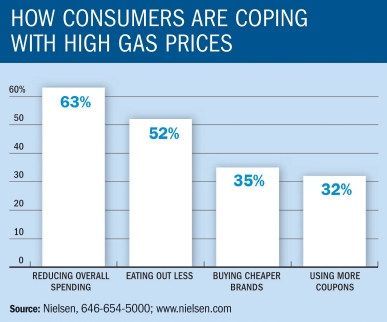
Gas prices are inspiring consumers to cut back in food-related purchases in several ways, according to a recent Nielsen study. Newly two-thirds (63%) are reducing their overall spending as a result, up from 49% since the beginning of the year. More consumers are eating out less (52%), buying less expensive brands (35%) and using more coupons (32%).
Another Nielsen study shows that consumers are looking with disfavor on a tactic adopted by several big food companies: “downsizing” packages, putting less product in them while keeping the same price. Based on a recent Nielsen Panel Views study, James Russo, vice president for food sector marketing at Nielsen, told Foodnavigator.com that consumers would prefer to buy larger packages in hopes of catching a price break rather than the downsized alternatives now being offered.
Organic foods are taking a hit, according to a study from The Hartman Group. Use of organics as a whole dropped from 73% to 69% between 2006 and 2008. The study noted, however, that other factors may be at work, such as uncertainty over the meaning of the term.
High-profile food safety scares and recalls also are shaping consumer attitudes. According to a Deloitte study, 56% of Americans believe imported foods are “not at all” or “somewhat” safe, while 80% think domestically produced foods are safe. Another Deloitte study showed strong support for country of origin labeling (COOL), with 86% supporting it for meat, 84% for fresh fish, 80% for fresh fruits and vegetables, and 69% for packaged food ingredients. COOL is already in place for fish, and (as of press time) was scheduled to go into effect Sept. 30 for fresh meat, produce and other foods.
Deloitte Consulting
212-618-4000
The Hartman Group
585-454-1740
Nielsen646-654-5000
